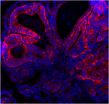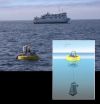This growth comes despite scientists' ever-increasing knowledge of the genetic mutations that initiate and drive this disease. Now, a team of researchers from the University of Pennsylvania has found evidence of a new culprit in the disease, a protein called MSI2.
Their findings provide a new target for potential therapeutic intervention in colorectal cancer and enhance our understanding of the complexities of cancer initiation and progression. Further studies of MSI2 may even help explain how the disease can return after lying dormant for years.
Christopher Lengner, an assistant professor in the Department of Animal Biology in Penn's School of Veterinary Medicine, was the senior author on the work. Collaborators from Penn Vet included co-lead authors Shan Wang and Ning Li as well as Maryam Yousefi, Angela Nakauka-Ddamba and Kimberly Parada. Additional co-authors from Penn included Fan Li, Brian Gregory and Shilpa Rao.
The Penn researchers teamed with Gerard Minuesa and Michael G. Kharas from Memorial Sloan-Kettering Cancer Center, Zhengquan Yu from China Agricultural University and Yarden Katz from the Broad Institute.
The research will appear in Nature Communications.
Lengner's research has long focused on how stem cells are able to differentiate into a variety of cell types, an ability known as stem cell potency. His lab's work dovetails with cancer research in that it is believed that a population of so-called cancer stem cells is responsible for sustaining cancer in the body once it is established, just as normal stem cells are responsible for continually renewing and sustaining our healthy cells.
In earlier studies, Lengner and Kharas had found that an RNA binding protein called MSI2 played a role in supporting the potency of hematopoietic stem cells. This same protein was also found to be highly active in blood cancers. Yet unlike other well-established genes that, when mutated, result in increased tumor formation, the MSI2 gene itself is not directly mutated in tumors. Rather, the normal, intact gene becomes highly activated as cancer progresses.
When MSI2 is active, the protein promotes cancer not by changing the expression of genes but by altering the ability of RNA to make proteins. Thus, until now, the contribution of MSI2 went undetected by traditional research techniques that are largely aimed at identifying mutations in DNA sequence and alterations in gene expression patterns.
Instead, in the current work, the Penn-led team performed an analysis to look for RNA transcripts that were highly expressed in cancerous tissues but not in normal tissue. They found overexpression of MSI2 was a common characteristic of colon cancer tumors. In addition, when they examined mice bred to lack APC, a key protein that, when lost, is associated with a skyrocketing risk of colon cancer, they found that these animals had high levels of MSI2 expression.
Next, they used colorectal cancer cell lines to experimentally block MSI2 activity and found the growth of the tumors was strongly inhibited, another sign that MSI2 promotes cancer growth.
Next the researchers turned to an animal model to see how MSI2 behaved in a whole organism. When they bred mice in which they could induce overexpression of MSI2 in the intestine, they found the mice looked very similar to animals in which APC had been lost; the mice's cells lost their ability to differentiate and the animals died within three or four days.
"It's really unusual to have such a striking phenotype," Lengner said.
These mice had patterns of RNA transcripts nearly identical to mice that lack APC, but MSI2 did not affect APC levels directly, suggesting that MSI2 acts downstream of APC. They also found that MSI2 appears to act in a molecular pathway independent from another critical oncogenic pathway activated upon APC loss, known as the Wnt/β-catenin signaling pathway.
"The dogma for the past 15 years has been that colorectal cancer is initiated by the loss of APC that triggers activation of β-catenin, in turn driving uncontrolled stem cell division," Lengner said. "But there's been some evidence recently that suggests that, while β-catenin is a critical oncogene downstream of APC loss, it isn't the only way losing APC leads to tumor formation. Based on our results, we think that activation of MSI2 downstream of APC loss drives this metabolic activation of stem cells and blocks stem cell differentiation."
To find out how MSI2 might accomplish this, Lengner and colleagues looked at all of the RNA transcripts to which MSI2 -- itself an RNA binding protein -- bound in the cells that line the intestine. Of particular interest, they found that MSI2 bound to several tumor suppressors, among them Pten, a well-known tumor suppressor whose loss promotes cancer progression in a number of tissues.
Further experiments confirmed that MSI2, through inhibition of Pten and other mechanisms, promotes the activation of cellular metabolism through a protein complex called mTORC1.
"Normally the mTORC1 complex is tightly regulated by the availability of nutrients and presence of growth factors, helping cells to generate the required building blocks to form new cells when they divide," Lengner said. "In the context of colorectal cancer, constant activation of mTORC1 through MSI2 enables cancer cells to constantly produce the materials required to form new cells, thus enabling the uncontrolled growth that culminates in the formation of aggressive tumors."
Lengner noted that drugs that target mTORC1 already exist and could be employed in conjunction with therapies that target the Wnt/β-catenin pathway to better treat colorectal cancers moving forward.
But it's also possible the path to a new, effective cancer treatment won't be that simple. Lengner and colleagues are also examining the role of the dormant cancer stem cell in maintaining cancers and causing recurrences years after apparent remission.
"This is really where we're heading, to see whether MSI2 has a role in controlling those dormant stem cells and possibly allowing cancers to remain hidden in the body," Lengner said. "That is a big black box."
INFORMATION:
The research was supported in part by grants from the National Institutes of Health's National Institute of Diabetes and Digestive and Kidney Diseases (P30DK050306) and National Cancer Institute (R01CA16865).


